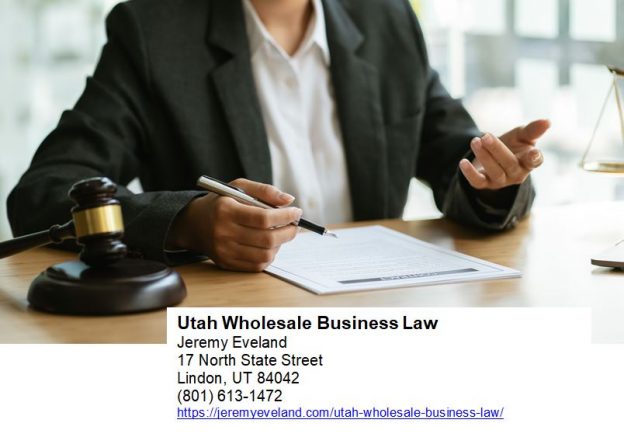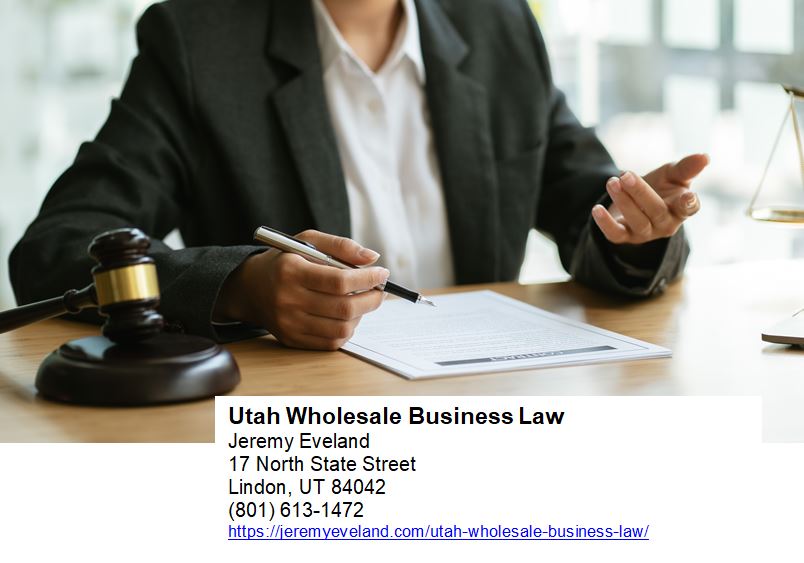Utah, the 45th state to enter the Union, is known for its unique liquor laws. These laws, established by the Utah Legislature and enforced by the Utah Department of Alcoholic Beverage Control, aim to regulate the sale, distribution, and consumption of alcoholic beverages within the state. As a business lawyer practicing in the State of Utah, it is crucial to have a comprehensive understanding of these liquor laws in order to effectively advise and represent clients operating in the alcohol industry. In this article, we will explore the key aspects of liquor laws in Utah, shedding light on the complexities and nuances that businesses need to navigate in order to ensure compliance and success.

1. Overview of Liquor Laws in Utah
Utah has a unique and strictly regulated liquor system, shaped by its historical and cultural background. Understanding the liquor laws in Utah is essential for anyone looking to operate a business in the state’s alcohol industry. This article aims to provide a comprehensive overview of the liquor laws in Utah, covering the history, current legal framework, and key regulatory bodies involved.
1.1 History of Liquor Laws
Utah’s liquor laws have been heavily influenced by its strong ties to the Church of Jesus Christ of Latter-day Saints and its historical prohibitionist stance. The state was among the first to implement prohibition in the early 1900s and was one of the last states to end it in 1933 after the repeal of the 18th Amendment.
Since then, Utah implemented strict regulations on alcohol sales and consumption, including limitations on alcohol content, serving sizes, and availability. These laws were primarily driven by a desire to discourage excessive drinking and maintain public safety.
1.2 Current Legal Framework
Today, Utah’s liquor laws are governed by the Utah Department of Alcoholic Beverage Control (DABC) and the Utah Alcoholic Beverage Control Act. The primary objective of these laws is to control the sale, distribution, and consumption of alcohol to ensure public safety and social responsibility.
The Utah Alcoholic Beverage Control Act outlines the various regulations and restrictions imposed on the sale and service of alcohol. It covers aspects such as licensing, permits, price regulation, importation, distribution, and enforcement.
1.3 Key Regulatory Bodies
The Utah Department of Alcoholic Beverage Control (DABC) is the key regulatory body responsible for overseeing and enforcing the liquor laws in Utah. The DABC is responsible for granting liquor licenses, issuing permits, conducting compliance checks, and ensuring compliance with the alcohol regulations. They work closely with other agencies such as the Utah Highway Patrol and local law enforcement to enforce liquor laws effectively.
2. Licensing and Permits for Alcohol Sale
2.1 Obtaining a Liquor License
If you intend to sell alcohol in Utah, obtaining a liquor license is a crucial step. The Utah DABC is responsible for granting liquor licenses, and the process involves several requirements and considerations. These include background checks, financial statements, location evaluation, and compliance with zoning regulations.
To obtain a liquor license, you must submit a detailed application to the DABC, along with the required fees. The application process can be complex and time-consuming, requiring the expertise of a business lawyer specializing in liquor licensing to navigate the legal requirements effectively.
2.2 Types of Liquor Licenses
Utah offers several types of liquor licenses, each catering to specific business needs and requirements. These include a full-service restaurant license, limited-service restaurant license, tavern license, wine-only restaurant license, private club license, and special use permit, among others.
Each license has its own set of criteria and restrictions, such as the types of alcoholic beverages that can be sold, operating hours, and whether minors are allowed on the premises. It is important to consult with a business lawyer to determine the most suitable license for your specific business model and goals.
2.3 License Renewal and Transfer
Liquor licenses in Utah require periodic renewal, typically on an annual basis. The renewal process involves submitting updated information, such as financial statements and compliance records, and paying the necessary fees.
Transferring a liquor license to another individual or entity also requires careful consideration and legal assistance. Depending on the circumstances, approval from the DABC may be necessary, and specific requirements must be fulfilled to complete the transfer process successfully.
2.4 Special Event Permits
In Utah, special event permits are required for selling and serving alcohol at temporary events, such as festivals, concerts, and fundraisers. These permits allow for the legal sale and consumption of alcohol in designated areas during the event.
Obtaining a special event permit involves providing detailed information about the event, including dates, location, and expected attendance. The DABC will review the application, ensuring compliance with regulations and public safety concerns before granting the permit.
3. Alcohol Sales and Service Restrictions
3.1 Hours and Days of Sale
Utah has strict regulations on the hours and days during which alcohol can be sold and served. Generally, alcohol sales are prohibited between 1:00 am and 10:00 am, with a few exceptions for certain establishments.
Sundays pose additional limitations, with alcohol sales allowed only after 10:00 am in restaurants and private clubs, and after 11:00 am in bars and taverns. It’s important to be aware of these restrictions to adhere to the law and avoid penalties.
3.2 Age Restrictions for Purchasers
Utah strictly enforces age restrictions for purchasers and consumers of alcohol. The legal drinking age is 21, and businesses must verify the age of anyone attempting to purchase or consume alcohol.
Proper identification, such as a valid driver’s license or passport, must be presented to prove legal drinking age. Failing to comply with age verification requirements can result in severe penalties for both the individual and the business.
3.3 Responsible Beverage Service
Utah places a strong emphasis on responsible beverage service to ensure the safety and well-being of its residents and visitors. Businesses that sell or serve alcohol are required to train and educate their staff on responsible alcohol service practices.
Responsible beverage service training typically covers topics such as recognizing signs of intoxication, preventing underage drinking, and managing difficult situations. It is strongly advised for businesses to invest in comprehensive training programs to promote responsible drinking and minimize potential liabilities.
3.4 Dram Shop Liability
Utah has dram shop liability laws that hold businesses accountable for injuries or damages caused by individuals who were served alcohol at their establishments. Under certain circumstances, a business can be held liable if they continue to serve alcohol to a visibly intoxicated person or to someone who is underage.
Understanding and adhering to dram shop liability laws are crucial for businesses to avoid potential legal issues and financial damages. Consulting with a business lawyer who specializes in liquor liability can help ensure compliance with these laws and mitigate potential risks.
4. Pricing and Markup Regulation
4.1 State-Imposed Markup
Utah employs a unique system for pricing and markup regulation, known as the “Control State System.” Under this system, the state maintains control over the wholesale distribution and pricing of all alcoholic beverages.
The state-imposed markup ensures consistency in pricing across all retailers and helps generate revenue for the state. The markup varies depending on the type and size of the alcoholic beverage, and it is important for businesses to understand and factor in these costs when pricing their products.
4.2 Happy Hour and Discounting
Utah regulates happy hour and discounting practices to prevent excessive drinking and promote responsible consumption. Traditionally, Utah prohibited happy hour promotions; however, recent changes in the law now allow for limited-time discounts on alcoholic beverages.
Businesses must adhere to the specific guidelines outlined by the DABC regarding happy hour promotions to ensure compliance with the law. It is recommended to consult with a business lawyer to ensure that any discounting practices are in line with the regulations.
4.3 Advertising and Promotion
Advertising and promotion restrictions are in place to protect public health and prevent excessive alcohol consumption. Utah has specific guidelines regarding the content, timing, and placement of alcohol-related advertisements.
Advertisements must avoid promoting excessive drinking, targeting minors, or making false claims about the effects of alcohol. Advertisements should also comply with federal regulations and guidelines set by organizations such as the Alcohol and Tobacco Tax and Trade Bureau (TTB).

5. Private Club and Membership Requirements
5.1 Private Club Definition
In Utah, private clubs offer a unique way to serve alcoholic beverages outside the traditional restaurant or bar setting. Private clubs require a membership to access their amenities, including the sale and service of alcohol.
To qualify as a private club, the establishment must meet certain criteria, such as having a minimum number of members and providing specific amenities and services. Private club licenses provide flexibility in operating hours and allow the sale of liquor by the drink.
5.2 Membership and Entry Restrictions
Membership requirements and restrictions for private clubs vary depending on the establishment. However, certain regulations apply universally to ensure compliance with the law and prevent minors from accessing the premises.
Private clubs may require individuals to be of legal drinking age and have a valid membership to enter. Some clubs also limit membership to residents of Utah or surrounding areas. Understanding the membership and entry restrictions specific to each private club is crucial to ensure compliance and eligibility.
5.3 Perks and Benefits
Joining a private club in Utah comes with several perks and benefits beyond access to alcoholic beverages. Private clubs often offer amenities such as fine dining options, exclusive events, entertainment facilities, and networking opportunities.
Membership in a private club can provide a unique and upscale experience for individuals looking to enjoy alcohol in a more private and exclusive environment. Business lawyers specializing in liquor laws can provide guidance on joining and operating private clubs.
6. Alcohol Importation and Distribution
6.1 Alcohol Importation Regulations
Importing alcohol into Utah requires compliance with federal and state regulations. The Utah DABC oversees the importation of alcoholic beverages and ensures compliance with specific requirements.
Importers must obtain the necessary permits and licenses, adhere to labeling and packaging regulations, and pay any applicable duties and taxes. Understanding the importation regulations is essential to avoid legal issues and successfully distribute imported alcohol in Utah.
6.2 Distribution and Wholesale
Utah maintains strict control over the distribution and wholesale of alcohol through the state-operated Department of Alcoholic Beverage Control (DABC). The DABC oversees the distribution of alcoholic beverages to licensed retailers throughout the state.
Wholesalers must have the appropriate licenses and permits to distribute alcohol within Utah. Compliance with the DABC’s regulations and requirements is crucial for wholesalers and distributors to operate legally and avoid penalties.
6.3 Direct Shipping
Direct shipping of alcohol to consumers is subject to specific regulations in Utah. Currently, Utah allows direct shipping of wine and spirits from licensed wineries, distilleries, and retailers located both within and outside the state.
Consumers must be of legal drinking age and can only receive a limited quantity of alcohol per month. Additionally, the alcohol must be shipped by a licensed carrier and be properly labeled and packaged to comply with Utah’s regulations.
7. Restaurant and Bar Regulations
7.1 Alcohol Service in Bars and Restaurants
Restaurants and bars in Utah must comply with specific regulations to legally serve alcohol. These regulations cover factors such as licensing, operating hours, responsible beverage service, and compliance with health and safety standards.
Restaurants and bars must obtain the appropriate liquor license, adhere to the designated hours of sale, and ensure their staff is properly trained in responsible beverage service. Violating these regulations can result in fines, license suspensions, or other penalties.
7.2 Zoning and Location Restrictions
Zoning and location restrictions play a significant role in the establishment of bars and restaurants that serve alcohol in Utah. Local municipalities set guidelines and regulations to control the density and location of businesses that sell alcoholic beverages.
Zoning requirements may dictate the distance between liquor establishments and schools, religious institutions, or residential areas. It is crucial for businesses to consult with a business lawyer to navigate these regulations effectively and select an appropriate location for their operations.
8. BYOB and Open Container Laws
8.1 Bring Your Own Bottle (BYOB) Policy
Utah currently does not allow Bring Your Own Bottle (BYOB) policies in restaurants or other establishments. Liquor must be purchased from a licensed seller and consumed on the premises that have the appropriate license.
BYOB policies can result in violations of liquor laws and potential liability issues for both the establishment and individuals involved. It is important to understand and comply with these laws to avoid legal consequences.
8.2 Open Container Laws
Utah has stringent open container laws that prohibit the consumption of alcohol in public places and motor vehicles. Open containers of alcoholic beverages are not permitted in vehicles, including both the driver and passenger areas.
Public consumption of alcohol is also prohibited, except in certain designated areas or during authorized events. Violations of open container laws can result in fines, license suspensions, or even criminal charges.

9. Penalties and Enforcement
9.1 Civil and Criminal Penalties
Utah imposes various civil and criminal penalties for violations of liquor laws. Consequences of non-compliance can range from monetary fines and license suspensions to criminal charges and imprisonment.
The severity of penalties depends on the nature and frequency of the violation, as well as any previous violations. It is vital for businesses to ensure strict adherence to liquor laws and seek legal assistance to address any compliance issues proactively.
9.2 Compliance Checks and Inspections
To ensure compliance with liquor laws, Utah conducts regular compliance checks and inspections. These checks are carried out by the DABC, the Utah Highway Patrol, and local law enforcement agencies.
Compliance checks involve verifying legal drinking age requirements, responsible beverage service practices, license validity, and conformity with zoning and operational regulations. Non-compliance during inspections can lead to penalties and potential legal consequences.
9.3 Enforcement Agencies
Various agencies are responsible for enforcing liquor laws in Utah. The Utah Department of Alcoholic Beverage Control (DABC) serves as the primary enforcement agency, ensuring compliance with licensing, permitting, and operational regulations.
Other agencies, such as the Utah Highway Patrol and local law enforcement, assist in enforcing liquor laws by conducting compliance checks and inspections. It is crucial for businesses to maintain constant compliance with all regulations to avoid penalties and legal issues.
10. Recent Changes and Potential Reforms
10.1 Recent Amendments
Utah’s liquor laws have undergone several amendments in recent years to address changing societal norms and demands. These amendments aimed to provide more flexibility to businesses while maintaining responsible alcohol consumption practices.
Some recent amendments include allowing certain happy hour promotions, direct shipping of alcohol, and revisions in operating hours for restaurants, bars, and private clubs. Staying updated with these changes is important to ensure compliance and take advantage of new opportunities.
10.2 Proposed Reforms
The landscape of liquor laws in Utah continues to evolve, and there are ongoing discussions regarding potential reforms. Proposed reforms may involve further relaxation of regulations, changes in licensing requirements, or modifications to pricing and distribution systems.
Keeping abreast of these proposed reforms is important for businesses in the alcohol industry to anticipate potential changes and adapt their operations accordingly. Consulting with a business lawyer who specializes in liquor laws can provide valuable insights into the potential impacts of these reforms.
Frequently Asked Questions (FAQs)
-
Can I apply for a liquor license in Utah without legal assistance? Applying for a liquor license in Utah involves navigating complex legal requirements and regulations. It is highly recommended to seek legal assistance from a business lawyer who specializes in liquor licensing to ensure a smooth and successful application process.
-
What are the consequences of violating Utah’s liquor laws? Violations of Utah’s liquor laws can lead to various penalties, including fines, license suspensions, criminal charges, and imprisonment. The severity of the consequences will depend on the nature, frequency, and impact of the violation.
-
Are there any restrictions on happy hour promotions in Utah? Utah recently relaxed some restrictions on happy hour promotions, allowing limited-time discounts on alcoholic beverages. However, businesses must adhere to specific guidelines outlined by the Utah DABC to ensure compliance with the law.
-
What is dram shop liability, and how does it apply in Utah? Dram shop liability holds businesses accountable for injuries or damages caused by individuals who were served alcohol at their establishments. Utah has specific laws regarding dram shop liability, and businesses can be held liable if they continue to serve alcohol to visibly intoxicated individuals or minors.
-
Are individuals allowed to bring their own alcohol to restaurants or bars in Utah? Utah currently does not allow Bring Your Own Bottle (BYOB) policies in restaurants or bars. All alcohol consumed on the premises must be purchased from a licensed seller.

